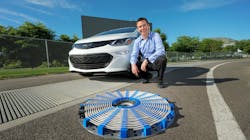USU launches NSF-funded engineering research center for electrified transportation
Utah State University (USU) has been awarded a five-year, $26-million grant, renewable to 10-year $50.6 million, by the National Science Foundation (NSF) to develop an international research center dedicated to advancing sustainable, electrified transportation.
The center is expected to raise more than $200 million over the next decade in government and industry support. The grant establishes an Engineering Research Center focused on developing new infrastructure that facilitates widespread adoption of electric vehicles. The center is named ASPIRE — Advancing Sustainability through Powered Infrastructure for Roadway Electrification.
“ASPIRE represents the very best of what a research university brings to the state and community,” said USU President Noelle E. Cockett. “The center will provide unprecedented opportunities for students and further Utah State’s ability to cultivate a diverse and innovative workforce ready to address complex challenges such as air quality and sustainability.”
The center launches at a critical moment, as the nationwide transportation and electric utility infrastructure need renovation. At the same time, vehicle emissions have serious impacts on public health and the environment, and fluctuating oil prices affect household budgets and economic stability. Electric vehicles play an important role in transforming the future of transportation, yet challenges remain to achieve sustainable and widespread adoption. Key to this new model of electric vehicle use is the development of charging technology that is built into roadways and parking facilities. ASPIRE researchers are developing holistic solutions that eliminate range and charging as obstacles to the broader electrification of all vehicles, including passenger cars and long-haul, heavy-duty trucks.
“Now is the time to move past century-old mindsets and rethink how roadways and electric grid infrastructure can be co-designed to support low-cost, sustainable solutions for vehicle electrification and decarbonization of the electric grid,” said USU Professor and ASPIRE Center Director Regan Zane.
Since joining USU in 2012, Zane has raised more than $30 million in research funding. The 10-year ASPIRE award brings the total to more than $80 million. In 2015, he launched the multi-institutional, industry-sponsored Center for Sustainable Electrified Transportation, known as SELECT. That same year, USU unveiled the world’s first electrified test track. The solar-powered track is equipped with power transfer coils embedded in the roadway, which enable properly equipped electric vehicles to charge while in motion. Wireless charging reduces the need for heavy battery packs and numerous charging stations.
ASPIRE builds on the success of the SELECT center and incorporates the test track complex as a fundamental ASPIRE research facility. Earlier this year, the state committed $3 million to expand SELECT and help attract NSF funding for the new center.
“Our mission is to improve health and quality of life by catalyzing sustainable and equitable electrification across the transportation industry,” said Zane. “We have organized a phenomenal team with proven dedication to students, community and engagement, and we intend to have a lasting positive impact on the state of Utah, our partner states and the nation.”
ASPIRE will be headquartered at USU and operated through strategic partnerships with Purdue University, University of Colorado Boulder, The University of Texas at El Paso and the University of Auckland New Zealand. Additional partners include researchers at Colorado State University, University of Colorado, Colorado Springs, Virginia Tech and Cornell University and four national laboratories. Global industry partnerships include more than 45 companies and organizations across the transportation and electric utility industries.
ASPIRE is designated as an Engineering Research Center, the National Science Foundation’s flagship program for transformative, multi-institutional research. It is one of four new Engineering Research Centers announced Aug 4. It is the first in Utah in more than 30 years and the only one dedicated to advancing sustainable transportation. After 10 years, ASPIRE will achieve graduated status and will continue as a self-sustaining research center.
